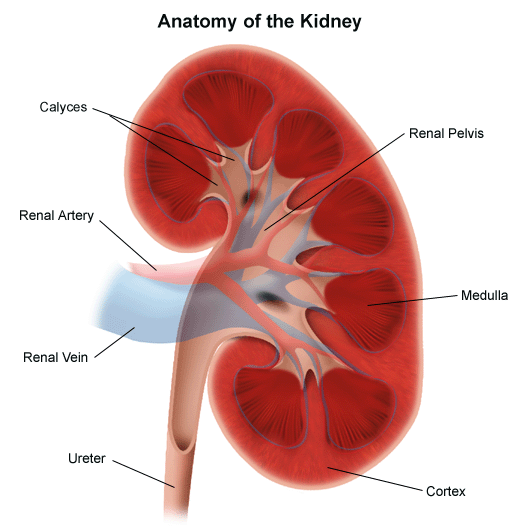Glomerulonephritis | Symptoms & Causes
What causes glomerulonephritis?
GN may be caused by several different disease states or by a genetic disorder. Some disease states associated with GN include:
- systemic diseases, such as lupus
- polyarteritis nodosa group: an inflammatory disease of the arteries
- Wegener vasculitis: a progressive disease that leads to widespread inflammation of all of the organs in the body
- Henoch-Schvnlein purpura: a disease usually seen in children and associated with purpura (small or large purple lesions on the skin and internally on the organs) that involves multiple organ systems
GN can also result from a gene on the X chromosome passed from carrier mothers who have no features, or minimal features of GN, to their sons, who are affected with the disorder in 50 percent of the cases.
What are the symptoms of glomerulonephritis?
Symptoms of glomerulonephritis may depend on whether your child has the acute or chronic form, and symptoms also differ depending on what caused the glomerulonephritis.
Symptoms may include:
- cola-colored or iced tea-colored urine (from blood and protein)
- sore throat
- diminished urine output
- fatigue
- lethargy
- nausea and vomiting
- increased breathing effort
- headache
- high blood pressure
- seizures (may occur as a result of high blood pressure)
- rash, especially on the buttocks and legs
- weight loss
- joint pain
- pale skin color
- edema (fluid accumulation in the tissues)
- hyperpigmentation (skin may appear yellow or brown)
Glomerulonephritis | Diagnosis & Treatments
How is glomerulonephritis diagnosed?
In addition to a thorough physical examination and complete medical history, your child's physician may order the following diagnostic tests:
- throat culture
- urine tests
- blood tests
- electrocardiogram (ECG or EKG): a test that records the electrical activity of your child's heart, shows abnormal rhythms (arrhythmias or dysrhythmias) and detects heart muscle damage
- renal ultrasound (also called sonography): a non-invasive test in which a transducer is passed over your child's kidney producing sound waves that bounce off of the kidney and transmit a picture of the organ on a video screen.
- chest x-ray: a diagnostic test which uses invisible x-ray energy beams to produce images of internal tissues, bones, and organs onto film.
- renal biopsy: a procedure in which a small sample of tissue is taken from you child's kidney through a needle. We conduct tests on the tissue to determine the specific disease.
How is glomerulonephritis treated?
If your child has APSGN, treatment will focus on curing her infection and treating her symptoms associated with the infection. Unfortunately, a cure for GN has not been found; therefore treatments focus on slowing the progression of the disease and preventing complications.
Treatment for glomerulonephritis may include:
- fluid restriction
- decreased protein diet
- decreased salt and potassium diet
- medication, such as blood pressure medicines, corticosteroids, or immunosuppressives
- diuretics
- blood pressure medications
- phosphate binders: medications to decrease the amount of the mineral phosphorus in the blood
- immunosuppressive agents
- dialysis: a medical treatment that removes waste and additional fluid from the blood after the kidneys have stopped functioning
- dietary restrictions on salt, fluids, protein, and other substances



